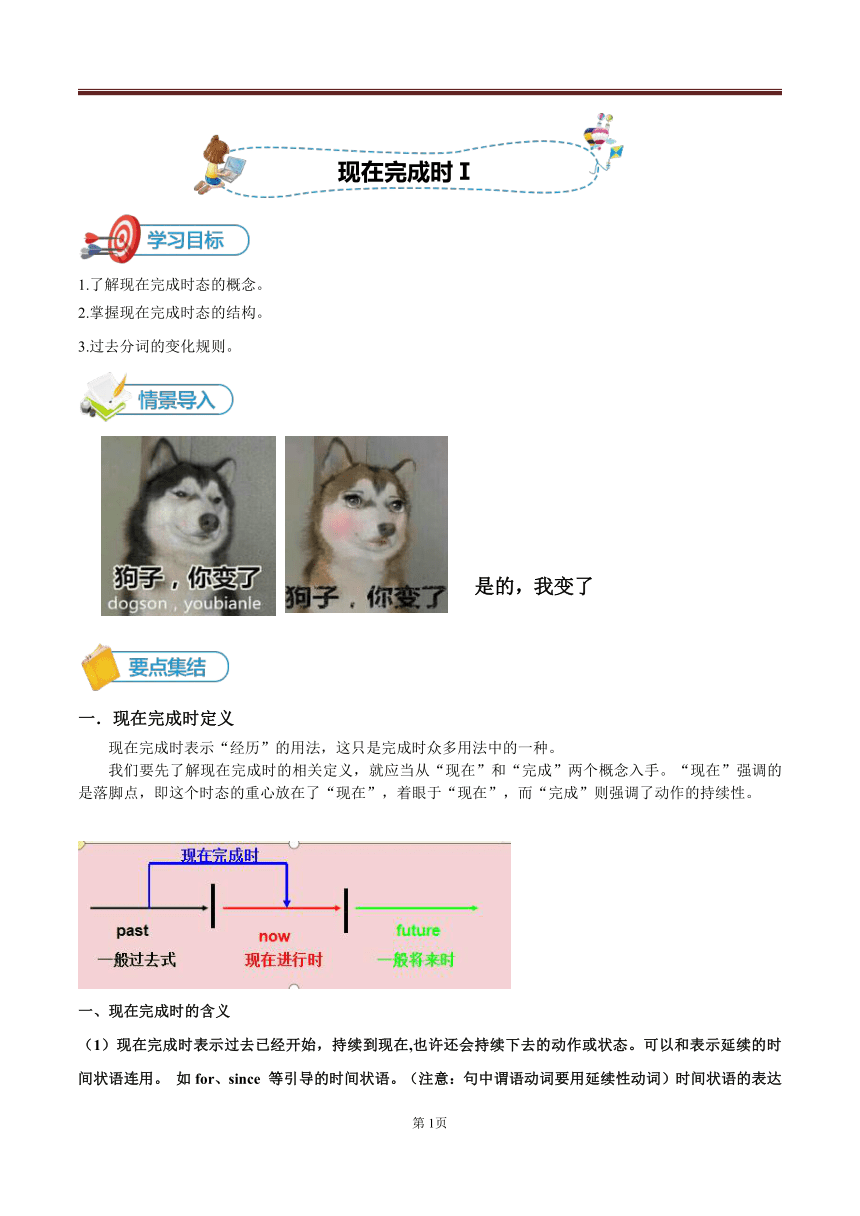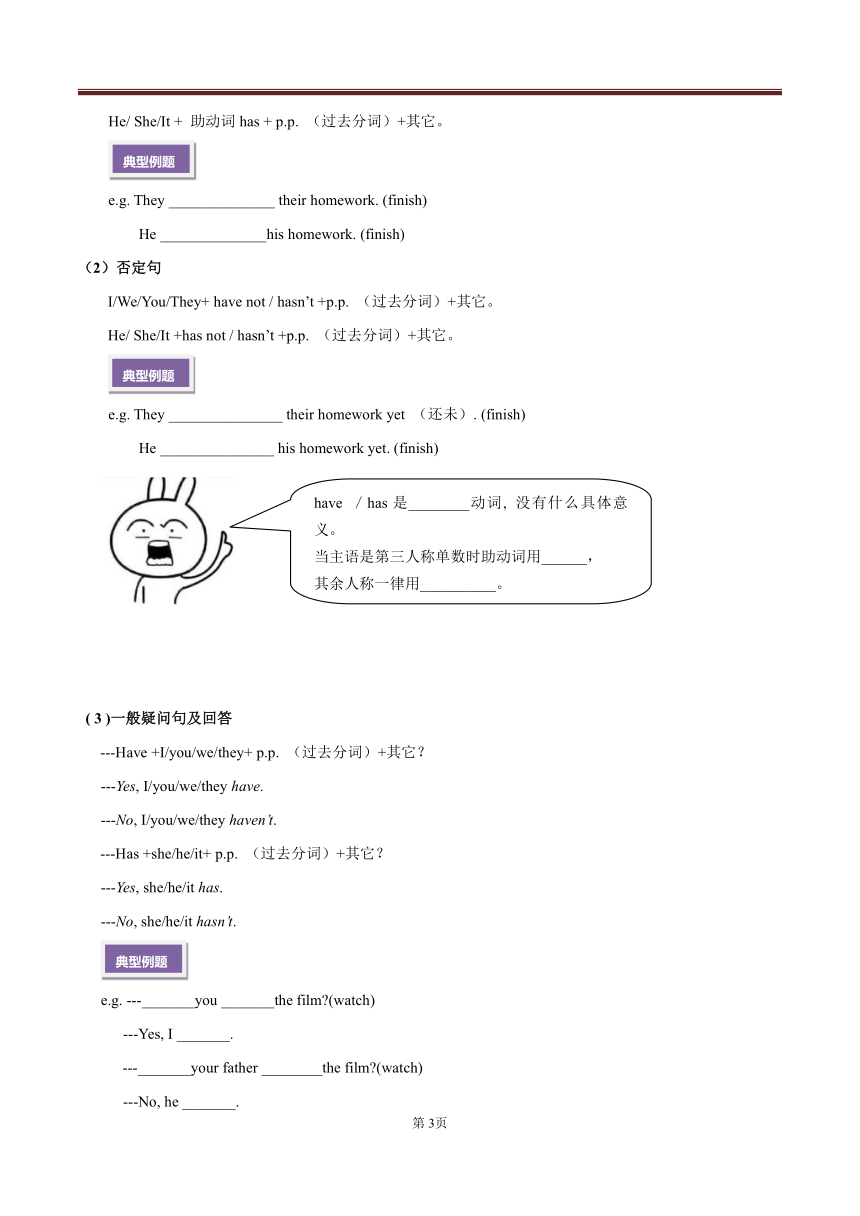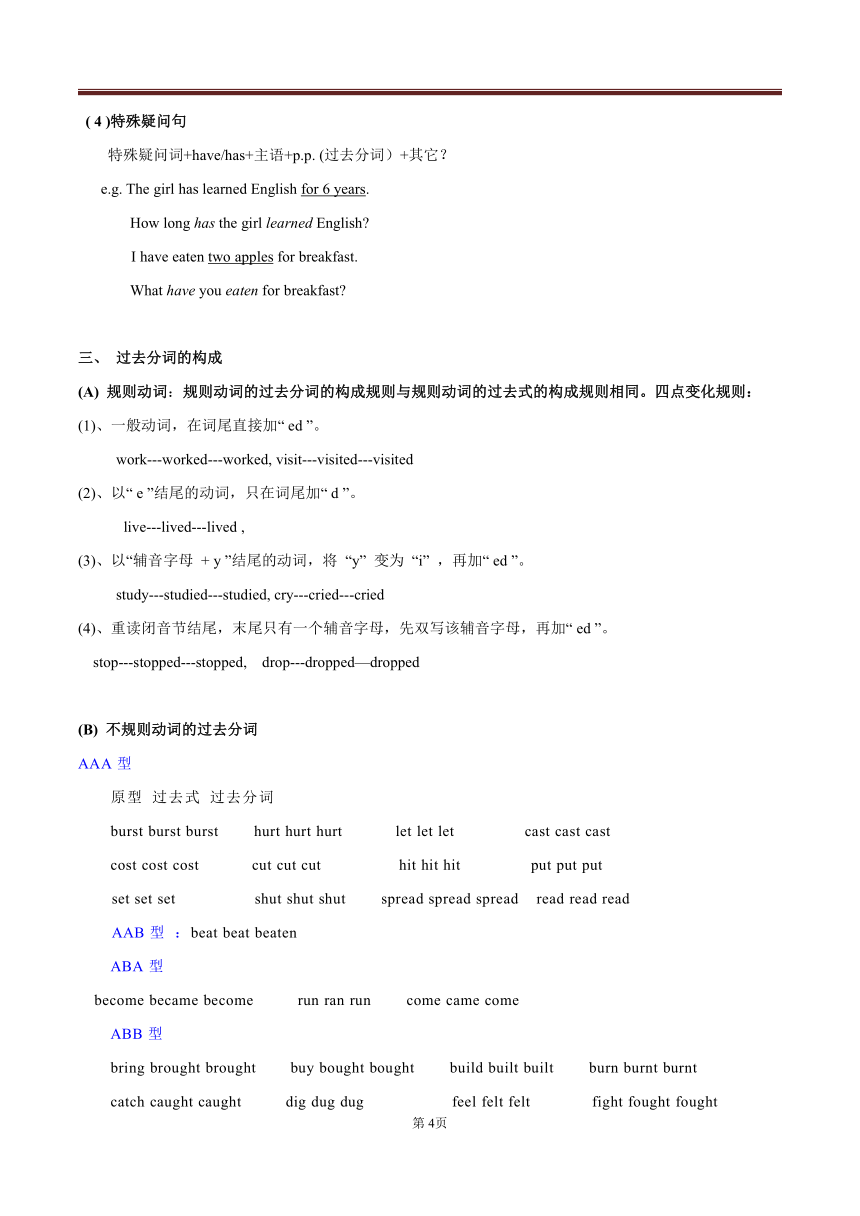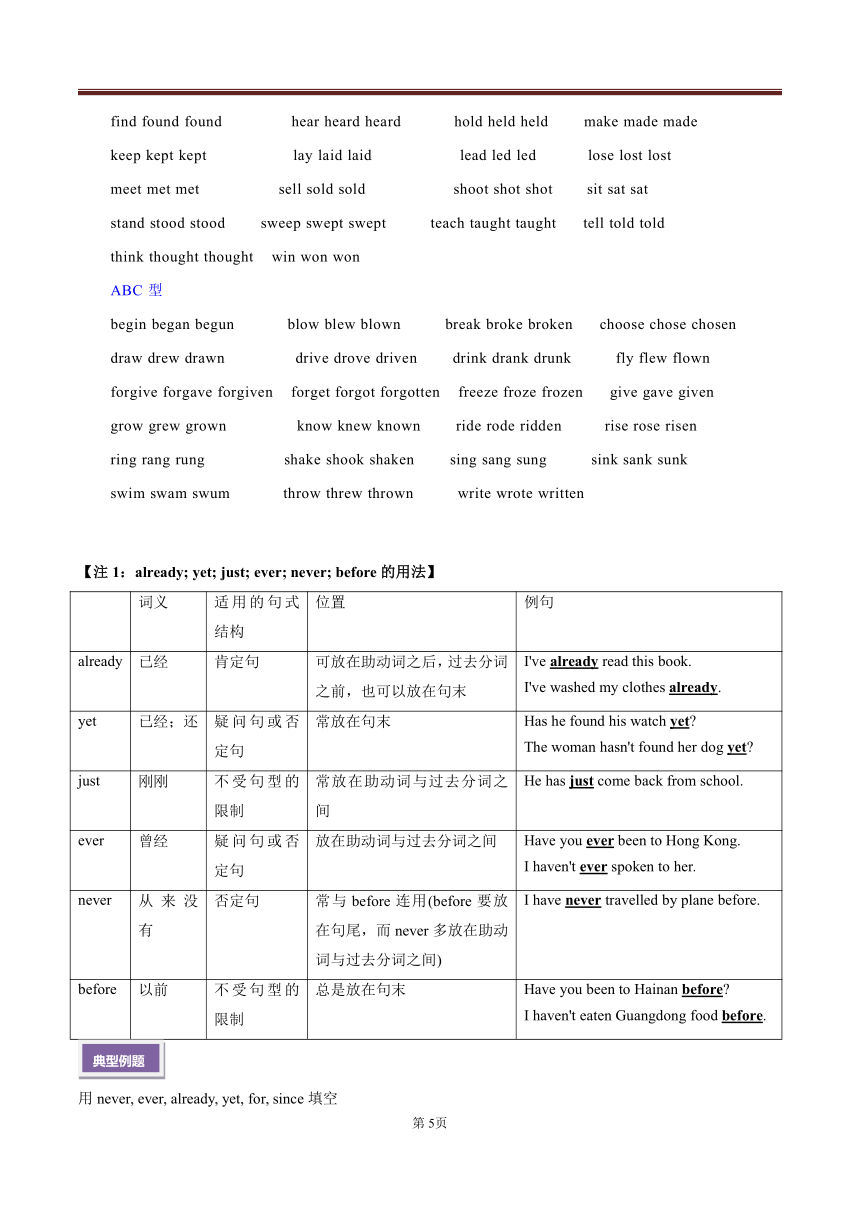2020-2021学年牛津译林英语八年级下册Unit 1 Past and Present知识讲解 语法现在完成时学案1(含答案)
文档属性
| 名称 | 2020-2021学年牛津译林英语八年级下册Unit 1 Past and Present知识讲解 语法现在完成时学案1(含答案) |  | |
| 格式 | doc | ||
| 文件大小 | 1008.5KB | ||
| 资源类型 | 教案 | ||
| 版本资源 | 牛津译林版 | ||
| 科目 | 英语 | ||
| 更新时间 | 2021-04-17 15:57:20 | ||
图片预览





文档简介
1.了解现在完成时态的概念。
2.掌握现在完成时态的结构。
3.过去分词的变化规则。
现在完成时定义
现在完成时表示“经历”的用法,这只是完成时众多用法中的一种。
我们要先了解现在完成时的相关定义,就应当从“现在”和“完成”两个概念入手。“现在”强调的是落脚点,即这个时态的重心放在了“现在”,着眼于“现在”,而“完成”则强调了动作的持续性。
一、现在完成时的含义
(1)现在完成时表示过去已经开始,持续到现在,也许还会持续下去的动作或状态。可以和表示延续的时间状语连用。 如for、since 等引导的时间状语。(注意:句中谓语动词要用延续性动词)时间状语的表达方法有两种:
for: + 一段时间 for a year, for two weeks, for three years...
过去的某一时刻, since last week, since 2008…
Since 一段时间+ago, since 9 years ago, since 3 days ago…,
一般过去时态的时间状语从句:since you came,since he moved here, since I was born…
例如:1.Eddie has lived with Millie for 4 years.
since2011.
Coffey has lived in Kunshan since 4 years ago.
since she left school.
用since或for填空:
1. I have been at this school ____________ more than two years.
2. She has worked in the factory ___________ ten years ago.
3. Mr. Green has lived in the city ____________ he was born.
4. His father has been a party member ___________ twenty years.
(2)现在完成时表示过去发生或已经完成的某一动作对现在造成的影响或结果。(汉语中常用“已经”、“过”、“了”等表达) 通常与表示包括现在在内的时间副词just(句中), already(句中,句末), before(句末), yet(句末), never(句中), ever(句中),recently(句末)等状语连用。例如:
例如:1.Eddie has just eaten my food. (Eddie已经吃了我的食物。)
2.I have never heard of that before.(我以前从未听说过那件事)
3. Have you ever ridden a horse? (你曾经骑过马吗?)
4. She has already finished the work.(她早已经完成这个工作了。)
5. We haven’t finished our homework yet. (我们还没有完成作业呢。)
结构
(1)肯定句:
I/We/You/They + 助动词have + p.p. (过去分词)+其它。
He/ She/It + 助动词has + p.p. (过去分词)+其它。
e.g. They ______________ their homework. (finish)
He ______________his homework. (finish)
(2)否定句
I/We/You/They+ have not / hasn’t +p.p. (过去分词)+其它。
He/ She/It +has not / hasn’t +p.p. (过去分词)+其它。
e.g. They _______________ their homework yet (还未). (finish)
He _______________ his homework yet. (finish)
( 3 )一般疑问句及回答
---Have +I/you/we/they+ p.p. (过去分词)+其它?
---Yes, I/you/we/they have.
---No, I/you/we/they haven’t.
---Has +she/he/it+ p.p. (过去分词)+其它?
---Yes, she/he/it has.
---No, she/he/it hasn’t.
e.g. ---_______you _______the film?(watch)
---Yes, I _______.
---_______your father ________the film?(watch)
---No, he _______.
( 4 )特殊疑问句
特殊疑问词+have/has+主语+p.p. (过去分词)+其它?
e.g. The girl has learned English for 6 years.
How long has the girl learned English?
I have eaten two apples for breakfast.
What have you eaten for breakfast?
三、 过去分词的构成
(A) 规则动词:规则动词的过去分词的构成规则与规则动词的过去式的构成规则相同。四点变化规则:
(1)、一般动词,在词尾直接加“ ed ”。
work---worked---worked, visit---visited---visited
(2)、以“ e ”结尾的动词,只在词尾加“ d ”。
live---lived---lived ,
(3)、以“辅音字母 + y ”结尾的动词,将 “y” 变为 “i” ,再加“ ed ”。
study---studied---studied, cry---cried---cried
(4)、重读闭音节结尾,末尾只有一个辅音字母,先双写该辅音字母,再加“ ed ”。
stop---stopped---stopped, drop---dropped—dropped
(B) 不规则动词的过去分词
AAA型
原型 过去式 过去分词
burst burst burst hurt hurt hurt let let let cast cast cast
cost cost cost cut cut cut hit hit hit put put put
set set set shut shut shut spread spread spread read read read
AAB型 :beat beat beaten
ABA型
become became become run ran run come came come
ABB型
bring brought brought buy bought bought build built built burn burnt burnt
catch caught caught dig dug dug feel felt felt fight fought fought
find found found hear heard heard hold held held make made made
keep kept kept lay laid laid lead led led lose lost lost
meet met met sell sold sold shoot shot shot sit sat sat
stand stood stood sweep swept swept teach taught taught tell told told
think thought thought win won won
ABC型
begin began begun blow blew blown break broke broken choose chose chosen
draw drew drawn drive drove driven drink drank drunk fly flew flown
forgive forgave forgiven forget forgot forgotten freeze froze frozen give gave given
grow grew grown know knew known ride rode ridden rise rose risen
ring rang rung shake shook shaken sing sang sung sink sank sunk
swim swam swum throw threw thrown write wrote written
【注1:already; yet; just; ever; never; before的用法】
词义 适用的句式结构 位置 例句
already 已经 肯定句 可放在助动词之后,过去分词之前,也可以放在句末 I've already read this book.
I've washed my clothes already.
yet 已经;还 疑问句或否定句 常放在句末 Has he found his watch yet?
The woman hasn't found her dog yet?
just 刚刚 不受句型的限制 常放在助动词与过去分词之间 He has just come back from school.
ever 曾经 疑问句或否定句 放在助动词与过去分词之间 Have you ever been to Hong Kong.
I haven't ever spoken to her.
never 从来没有 否定句 常与before连用(before要放在句尾,而never多放在助动词与过去分词之间) I have never travelled by plane before.
before 以前 不受句型的限制 总是放在句末 Have you been to Hainan before?
I haven't eaten Guangdong food before.
用never, ever, already, yet, for, since填空
1)?I have _______ seen him before, so I have no idea about him.
2)?Jack has _________ finished his homework ________ an hour ago.
3)?Mr. Wang has taught in this school ________ ten years.
4)?“Have you ________ seen the film?” “No, I have ________ seen it.”
5)?“Has the bus left _______?” “Yes, it has _________ left.”
答案:1) never 2) already; since 3) for 4) ever; never 5) yet; already
例1:( ) ----Do you know the moving story of Jack and Rose? (2012淮安)
----Of course. I _______the film Titanic several times.
see B. saw C. have seen D. had seen
解析:该题考查的是现在完成时。因有several times。
答案C。
例2:( ) —Your English is good. (2012宿迁)
—Thank you. I _______ it for three years.
learn B. learned C. have learned D. had learned
解析:该题考查的是标志性词for与现在完成时。
答案C。
例3:( ) — John, you ____ the computer game for two hours. It’s bad for your eyes.
Stop, please!
— OK, Mum.
A. played B. have played C. were playing D. play
解析:该题考查的是现在完成时用法。 句中有for ten hours 所以用have+done.
答案:选B
表示过去发生或已完成的动作对现在造成的影响或结果
already与yet用法区别
already 用于肯定句,一般放在助动词与过去分词之间。
yet用于否定句和疑问句,一般至于句末。
例1:
I have already worked out this math problem? (改为否定句)
I worked out the math problem .
解析:already与yet的转换.
答案是 have not; yet
since 和for用法区别
(1)since的用法①since 后面加点时间,如since nearly three years ago或since2008.
②since引导时间状语从句时,后面的时间状语从句动词用一般过去时.
for的用法:for后加一段时间。
since/for 可以通过ago进行同义句转换。
例:They have worked in the factory since ten months ago.= They have worked in the factory for ten years
We have learned English for nearly three years. =We have learned English since three years ago.
例1: I haven’t seen you _____ last Friday.
A. for B. since C. from D. on
解析:后面的last Friday 是具体时间点,所以应该用since,选B
这里需要提醒学生虽然此题后面的last是一般过去时的时间标志,但是跟since连用之后要用现在完成时。
例2:( ) Mr. White came to our school in 2008, and since then he _____ us English. (2011盐城)
A. teaches B. taught C. has taught D. will teach
解析:该题考查的是现在完成时标志性词since,since then自那以后,缩略形式的时间状语从句,后面是主句,主句用现在完成时.
答案C。
A)?选用have, has填空:
1.?I?_______ told him the news.
2.?She?_______ come back from school.
3.?You?_______ won the game.
B)把下列句子变成否定句,一般疑问句,并作肯定,否定回答
1.I have already finished my lunch.
否定句:_____________________________________________________
一般疑问句:__________________________________________________
回答:______________________________________________________
2.She has gone out.
否定句:_____________________________________________________
一般疑问句:__________________________________________________
回答:______________________________________________________
检测题(一):用所给此词的适当形式填空。
1. It____________(rain)for a week.
2. I don’t know this woman. I____________( never,meet)her.
3.-Let’s go to the cinema.-No, I____________(see, already)the film.
4. We ____________( not finish)our homework yet. Will you wait a minute?
5. John ____________( not come)yet. He will be back in a minute.
6. Mr. Green often goes to America. In fact, he____________(be)there ten times.
7. -Where’s John? -He ____________just____________(go)to the teachers’ office.
8. She____________(study)English since she was ten.
9. Jim isn’t here. He____________(go)to the library. He____________(go)there an hour ago.
10. He ____________(never, travel )on a train in her life.
检测题(二):句型转换
1. The bus hasn’t arrived yet. (改成肯定句)
The bus ________ _______ __________.
2. I have watched the interesting film recently. (改成一般疑问句)
______ you ________ the interesting films recently?
3. I have already had my breakfast. (改为否定句)
I ________ had my breakfast ______.
4. I have already finished doing my homework. (改为一般疑问句)
_____ ________ finished doing your homework ________?
5. She has already worked out that difficult math problem. (改为否定句)
She _________ worked out that difficult problem __________.
答案
检测题1:1. has rained 2 have never met 3 have already seen 4 haven’t finished 5 hasn’t come
6 has been 7 has gone 8 has studies 9 has gone ;went 10 has never travelled
检测题2:1. has arrived already / has already arrived 2. Have, watched 3. haven't, yet
4. Have you, yet 5. hasn't, yet
Present perfect tense (现在完成时)
项目 内容 备注
概念 ◇表示一个过去发生的动作对现在产生的结果和影响。
Eddie has eaten my food.
(Eddie ate the food and now Hobo has nothing to eat.)
◇表示一个从过去某个时间开始,延续到现在,并有可能继续延续下去的动作或状态。
Eddie has lived with Mille since he was born.
Eddie has lived with Mille for four years.
构成 助动词has/have +动词的过去分词 动词过去分词规则变化跟对应的过去式一样,在后面加ed.特殊变化详见书本。(P122-123)
肯定形式 They have finished their homework.
He has finished his homework. 缩略形式:
they have=they’ve;
he has=he’s
否定形式 They haven’t finished their homework.
He hasn’t finished his homework.
疑问形式 Have they finished their homework?
Yes, they have. / No, they haven’t.
关键词
already(用于肯定句), yet(用于否定句和疑问句), since+一点时间, for+一段时间,
never, ever, three times(其它表示频率的词, once, twice等)
before, recently, in the past/last few years, so far, this month, today, now ◇表示过去某一个动作的结果,现在情况依然存在。这时一般不用时间状语。
I have lost my pen.
◇包括现在时间在内的时间状语如today, this month, this week等有时也用现在完成时。
现在完成时口诀 过去发生已完成,影响结果要记清;
谓动has/have +pp,just; ever; never; already;
so far; yet和before,完成时态要记牢;
开始过去到现在,延续动作或状态;
since; for; how long,谓语延续多思量。
练习
一.进入大神阶段:
1. Miss Zhang _____________(work) in this school for about three years.
2. We ____________(be) friends since we were children.
3. In the past three years, great changes__________(take place) in my hometown.
4. I ________ ________ here ________ ten years.我在这儿住了10年了。
5. You ______ _________ English ________ five years.你们学英语有五年了。
6. I _______ _______ here _________ ten years _______.我自从10年前就住在这儿了。
7. You ______ ________ English ________ five years _______.你们自从5年前就学英语了。
8. Mr Wang ______ ______ in this factory _______ he _______ to this city.
自从到这个城市以来,王先生一直在这家工厂工作。
9. We _______ ________ over ten English songs _____ _____.
迄今为止,我们已经学了十多首英文歌曲。
二、选择
1. Lucy __________ her dog and now she is walking it.
A. will find? B. is finding C. has found D. finds
2. Who_________ my English book? It was here just now, but I can’t find it now.
A. will take away B. is taking away C. takes away D. has taken away
3. —Where are my classmates?
—They _________ to the Great Wall.
A. will go B. go C. have gone D. went
4. —Would you like to see the film with me?
—I’m sorry I ________ it twice.
A. see B. am seeing C. will see D. have seen
5. —Mom, I want to ask father a question.
—Oh. He __________to the library.
A. go B. goes C. went D. has gone
6. —How do you like Japan, Miss Black?
—Sorry, I _________there before.
A. wasn’t going B. don’t go C. haven’t been D. won’t go
7. —Do you want to see the film Harry Potter II ?
—I _________ it already. It’s really wonderful.
A. saw B. see C. have seen D. will see
8. — Jack, would you like to see the movie Lion King with me?
— It’s an interesting film, but I ________ it.
A. see B. will see C. have seen D. saw
9. Henry speaks Chinese very well. He in China since 2002.
A. stays B. stayed C. is staying D. has stayed
10. —Would you like some more rice?
—No, thanks. I __________ enough.
A. have B. am having C. have had D. will have
三、写出下列单词的过去分词形式
work _________ finish ___________ arrive___________
change_________ see___________ have___________
marry__________ visit__________ miss___________
prefer__________ do___________ hear____________
live____________ clean________ study___________
meet___________ be __________ climb___________
plan____________ take_________ stop____________
keep____________ buy_________ spend____________
learn___________ forget__________ bring____________
四、选词填空
Group1 用for或since填空
1. He has lived in Nanjing ________ the year before last.
2. I’ve known him __________ we were children.
3. Our teacher has studied Japanese _________ three years.
4. She has been away from the city ___________ about ten years.
5. It’s about ten years __________ she left the city.
答案:
一.1.has worked 2. have been
3. has taken place 4.have lived, for
5. have learned, for 6.have lived , since , ago
7. have learned , since , ago 8. has worked, since ,moved
9. have ,learned, so far
二.CDCDD CCCDC
思路分析:找标志词,确定时态和相关细节。
三、写出下列单词的过去分词形式
worked; finished; arrived; changed; seen; had; married; visited; missed; preferred; done; heard; lived; cleaned; studied; met; been; climbed; planned; taken; stopped; kept; bought; spent; learned; forgotten; brought
四、since; since; for; for; since
2.掌握现在完成时态的结构。
3.过去分词的变化规则。
现在完成时定义
现在完成时表示“经历”的用法,这只是完成时众多用法中的一种。
我们要先了解现在完成时的相关定义,就应当从“现在”和“完成”两个概念入手。“现在”强调的是落脚点,即这个时态的重心放在了“现在”,着眼于“现在”,而“完成”则强调了动作的持续性。
一、现在完成时的含义
(1)现在完成时表示过去已经开始,持续到现在,也许还会持续下去的动作或状态。可以和表示延续的时间状语连用。 如for、since 等引导的时间状语。(注意:句中谓语动词要用延续性动词)时间状语的表达方法有两种:
for: + 一段时间 for a year, for two weeks, for three years...
过去的某一时刻, since last week, since 2008…
Since 一段时间+ago, since 9 years ago, since 3 days ago…,
一般过去时态的时间状语从句:since you came,since he moved here, since I was born…
例如:1.Eddie has lived with Millie for 4 years.
since2011.
Coffey has lived in Kunshan since 4 years ago.
since she left school.
用since或for填空:
1. I have been at this school ____________ more than two years.
2. She has worked in the factory ___________ ten years ago.
3. Mr. Green has lived in the city ____________ he was born.
4. His father has been a party member ___________ twenty years.
(2)现在完成时表示过去发生或已经完成的某一动作对现在造成的影响或结果。(汉语中常用“已经”、“过”、“了”等表达) 通常与表示包括现在在内的时间副词just(句中), already(句中,句末), before(句末), yet(句末), never(句中), ever(句中),recently(句末)等状语连用。例如:
例如:1.Eddie has just eaten my food. (Eddie已经吃了我的食物。)
2.I have never heard of that before.(我以前从未听说过那件事)
3. Have you ever ridden a horse? (你曾经骑过马吗?)
4. She has already finished the work.(她早已经完成这个工作了。)
5. We haven’t finished our homework yet. (我们还没有完成作业呢。)
结构
(1)肯定句:
I/We/You/They + 助动词have + p.p. (过去分词)+其它。
He/ She/It + 助动词has + p.p. (过去分词)+其它。
e.g. They ______________ their homework. (finish)
He ______________his homework. (finish)
(2)否定句
I/We/You/They+ have not / hasn’t +p.p. (过去分词)+其它。
He/ She/It +has not / hasn’t +p.p. (过去分词)+其它。
e.g. They _______________ their homework yet (还未). (finish)
He _______________ his homework yet. (finish)
( 3 )一般疑问句及回答
---Have +I/you/we/they+ p.p. (过去分词)+其它?
---Yes, I/you/we/they have.
---No, I/you/we/they haven’t.
---Has +she/he/it+ p.p. (过去分词)+其它?
---Yes, she/he/it has.
---No, she/he/it hasn’t.
e.g. ---_______you _______the film?(watch)
---Yes, I _______.
---_______your father ________the film?(watch)
---No, he _______.
( 4 )特殊疑问句
特殊疑问词+have/has+主语+p.p. (过去分词)+其它?
e.g. The girl has learned English for 6 years.
How long has the girl learned English?
I have eaten two apples for breakfast.
What have you eaten for breakfast?
三、 过去分词的构成
(A) 规则动词:规则动词的过去分词的构成规则与规则动词的过去式的构成规则相同。四点变化规则:
(1)、一般动词,在词尾直接加“ ed ”。
work---worked---worked, visit---visited---visited
(2)、以“ e ”结尾的动词,只在词尾加“ d ”。
live---lived---lived ,
(3)、以“辅音字母 + y ”结尾的动词,将 “y” 变为 “i” ,再加“ ed ”。
study---studied---studied, cry---cried---cried
(4)、重读闭音节结尾,末尾只有一个辅音字母,先双写该辅音字母,再加“ ed ”。
stop---stopped---stopped, drop---dropped—dropped
(B) 不规则动词的过去分词
AAA型
原型 过去式 过去分词
burst burst burst hurt hurt hurt let let let cast cast cast
cost cost cost cut cut cut hit hit hit put put put
set set set shut shut shut spread spread spread read read read
AAB型 :beat beat beaten
ABA型
become became become run ran run come came come
ABB型
bring brought brought buy bought bought build built built burn burnt burnt
catch caught caught dig dug dug feel felt felt fight fought fought
find found found hear heard heard hold held held make made made
keep kept kept lay laid laid lead led led lose lost lost
meet met met sell sold sold shoot shot shot sit sat sat
stand stood stood sweep swept swept teach taught taught tell told told
think thought thought win won won
ABC型
begin began begun blow blew blown break broke broken choose chose chosen
draw drew drawn drive drove driven drink drank drunk fly flew flown
forgive forgave forgiven forget forgot forgotten freeze froze frozen give gave given
grow grew grown know knew known ride rode ridden rise rose risen
ring rang rung shake shook shaken sing sang sung sink sank sunk
swim swam swum throw threw thrown write wrote written
【注1:already; yet; just; ever; never; before的用法】
词义 适用的句式结构 位置 例句
already 已经 肯定句 可放在助动词之后,过去分词之前,也可以放在句末 I've already read this book.
I've washed my clothes already.
yet 已经;还 疑问句或否定句 常放在句末 Has he found his watch yet?
The woman hasn't found her dog yet?
just 刚刚 不受句型的限制 常放在助动词与过去分词之间 He has just come back from school.
ever 曾经 疑问句或否定句 放在助动词与过去分词之间 Have you ever been to Hong Kong.
I haven't ever spoken to her.
never 从来没有 否定句 常与before连用(before要放在句尾,而never多放在助动词与过去分词之间) I have never travelled by plane before.
before 以前 不受句型的限制 总是放在句末 Have you been to Hainan before?
I haven't eaten Guangdong food before.
用never, ever, already, yet, for, since填空
1)?I have _______ seen him before, so I have no idea about him.
2)?Jack has _________ finished his homework ________ an hour ago.
3)?Mr. Wang has taught in this school ________ ten years.
4)?“Have you ________ seen the film?” “No, I have ________ seen it.”
5)?“Has the bus left _______?” “Yes, it has _________ left.”
答案:1) never 2) already; since 3) for 4) ever; never 5) yet; already
例1:( ) ----Do you know the moving story of Jack and Rose? (2012淮安)
----Of course. I _______the film Titanic several times.
see B. saw C. have seen D. had seen
解析:该题考查的是现在完成时。因有several times。
答案C。
例2:( ) —Your English is good. (2012宿迁)
—Thank you. I _______ it for three years.
learn B. learned C. have learned D. had learned
解析:该题考查的是标志性词for与现在完成时。
答案C。
例3:( ) — John, you ____ the computer game for two hours. It’s bad for your eyes.
Stop, please!
— OK, Mum.
A. played B. have played C. were playing D. play
解析:该题考查的是现在完成时用法。 句中有for ten hours 所以用have+done.
答案:选B
表示过去发生或已完成的动作对现在造成的影响或结果
already与yet用法区别
already 用于肯定句,一般放在助动词与过去分词之间。
yet用于否定句和疑问句,一般至于句末。
例1:
I have already worked out this math problem? (改为否定句)
I worked out the math problem .
解析:already与yet的转换.
答案是 have not; yet
since 和for用法区别
(1)since的用法①since 后面加点时间,如since nearly three years ago或since2008.
②since引导时间状语从句时,后面的时间状语从句动词用一般过去时.
for的用法:for后加一段时间。
since/for 可以通过ago进行同义句转换。
例:They have worked in the factory since ten months ago.= They have worked in the factory for ten years
We have learned English for nearly three years. =We have learned English since three years ago.
例1: I haven’t seen you _____ last Friday.
A. for B. since C. from D. on
解析:后面的last Friday 是具体时间点,所以应该用since,选B
这里需要提醒学生虽然此题后面的last是一般过去时的时间标志,但是跟since连用之后要用现在完成时。
例2:( ) Mr. White came to our school in 2008, and since then he _____ us English. (2011盐城)
A. teaches B. taught C. has taught D. will teach
解析:该题考查的是现在完成时标志性词since,since then自那以后,缩略形式的时间状语从句,后面是主句,主句用现在完成时.
答案C。
A)?选用have, has填空:
1.?I?_______ told him the news.
2.?She?_______ come back from school.
3.?You?_______ won the game.
B)把下列句子变成否定句,一般疑问句,并作肯定,否定回答
1.I have already finished my lunch.
否定句:_____________________________________________________
一般疑问句:__________________________________________________
回答:______________________________________________________
2.She has gone out.
否定句:_____________________________________________________
一般疑问句:__________________________________________________
回答:______________________________________________________
检测题(一):用所给此词的适当形式填空。
1. It____________(rain)for a week.
2. I don’t know this woman. I____________( never,meet)her.
3.-Let’s go to the cinema.-No, I____________(see, already)the film.
4. We ____________( not finish)our homework yet. Will you wait a minute?
5. John ____________( not come)yet. He will be back in a minute.
6. Mr. Green often goes to America. In fact, he____________(be)there ten times.
7. -Where’s John? -He ____________just____________(go)to the teachers’ office.
8. She____________(study)English since she was ten.
9. Jim isn’t here. He____________(go)to the library. He____________(go)there an hour ago.
10. He ____________(never, travel )on a train in her life.
检测题(二):句型转换
1. The bus hasn’t arrived yet. (改成肯定句)
The bus ________ _______ __________.
2. I have watched the interesting film recently. (改成一般疑问句)
______ you ________ the interesting films recently?
3. I have already had my breakfast. (改为否定句)
I ________ had my breakfast ______.
4. I have already finished doing my homework. (改为一般疑问句)
_____ ________ finished doing your homework ________?
5. She has already worked out that difficult math problem. (改为否定句)
She _________ worked out that difficult problem __________.
答案
检测题1:1. has rained 2 have never met 3 have already seen 4 haven’t finished 5 hasn’t come
6 has been 7 has gone 8 has studies 9 has gone ;went 10 has never travelled
检测题2:1. has arrived already / has already arrived 2. Have, watched 3. haven't, yet
4. Have you, yet 5. hasn't, yet
Present perfect tense (现在完成时)
项目 内容 备注
概念 ◇表示一个过去发生的动作对现在产生的结果和影响。
Eddie has eaten my food.
(Eddie ate the food and now Hobo has nothing to eat.)
◇表示一个从过去某个时间开始,延续到现在,并有可能继续延续下去的动作或状态。
Eddie has lived with Mille since he was born.
Eddie has lived with Mille for four years.
构成 助动词has/have +动词的过去分词 动词过去分词规则变化跟对应的过去式一样,在后面加ed.特殊变化详见书本。(P122-123)
肯定形式 They have finished their homework.
He has finished his homework. 缩略形式:
they have=they’ve;
he has=he’s
否定形式 They haven’t finished their homework.
He hasn’t finished his homework.
疑问形式 Have they finished their homework?
Yes, they have. / No, they haven’t.
关键词
already(用于肯定句), yet(用于否定句和疑问句), since+一点时间, for+一段时间,
never, ever, three times(其它表示频率的词, once, twice等)
before, recently, in the past/last few years, so far, this month, today, now ◇表示过去某一个动作的结果,现在情况依然存在。这时一般不用时间状语。
I have lost my pen.
◇包括现在时间在内的时间状语如today, this month, this week等有时也用现在完成时。
现在完成时口诀 过去发生已完成,影响结果要记清;
谓动has/have +pp,just; ever; never; already;
so far; yet和before,完成时态要记牢;
开始过去到现在,延续动作或状态;
since; for; how long,谓语延续多思量。
练习
一.进入大神阶段:
1. Miss Zhang _____________(work) in this school for about three years.
2. We ____________(be) friends since we were children.
3. In the past three years, great changes__________(take place) in my hometown.
4. I ________ ________ here ________ ten years.我在这儿住了10年了。
5. You ______ _________ English ________ five years.你们学英语有五年了。
6. I _______ _______ here _________ ten years _______.我自从10年前就住在这儿了。
7. You ______ ________ English ________ five years _______.你们自从5年前就学英语了。
8. Mr Wang ______ ______ in this factory _______ he _______ to this city.
自从到这个城市以来,王先生一直在这家工厂工作。
9. We _______ ________ over ten English songs _____ _____.
迄今为止,我们已经学了十多首英文歌曲。
二、选择
1. Lucy __________ her dog and now she is walking it.
A. will find? B. is finding C. has found D. finds
2. Who_________ my English book? It was here just now, but I can’t find it now.
A. will take away B. is taking away C. takes away D. has taken away
3. —Where are my classmates?
—They _________ to the Great Wall.
A. will go B. go C. have gone D. went
4. —Would you like to see the film with me?
—I’m sorry I ________ it twice.
A. see B. am seeing C. will see D. have seen
5. —Mom, I want to ask father a question.
—Oh. He __________to the library.
A. go B. goes C. went D. has gone
6. —How do you like Japan, Miss Black?
—Sorry, I _________there before.
A. wasn’t going B. don’t go C. haven’t been D. won’t go
7. —Do you want to see the film Harry Potter II ?
—I _________ it already. It’s really wonderful.
A. saw B. see C. have seen D. will see
8. — Jack, would you like to see the movie Lion King with me?
— It’s an interesting film, but I ________ it.
A. see B. will see C. have seen D. saw
9. Henry speaks Chinese very well. He in China since 2002.
A. stays B. stayed C. is staying D. has stayed
10. —Would you like some more rice?
—No, thanks. I __________ enough.
A. have B. am having C. have had D. will have
三、写出下列单词的过去分词形式
work _________ finish ___________ arrive___________
change_________ see___________ have___________
marry__________ visit__________ miss___________
prefer__________ do___________ hear____________
live____________ clean________ study___________
meet___________ be __________ climb___________
plan____________ take_________ stop____________
keep____________ buy_________ spend____________
learn___________ forget__________ bring____________
四、选词填空
Group1 用for或since填空
1. He has lived in Nanjing ________ the year before last.
2. I’ve known him __________ we were children.
3. Our teacher has studied Japanese _________ three years.
4. She has been away from the city ___________ about ten years.
5. It’s about ten years __________ she left the city.
答案:
一.1.has worked 2. have been
3. has taken place 4.have lived, for
5. have learned, for 6.have lived , since , ago
7. have learned , since , ago 8. has worked, since ,moved
9. have ,learned, so far
二.CDCDD CCCDC
思路分析:找标志词,确定时态和相关细节。
三、写出下列单词的过去分词形式
worked; finished; arrived; changed; seen; had; married; visited; missed; preferred; done; heard; lived; cleaned; studied; met; been; climbed; planned; taken; stopped; kept; bought; spent; learned; forgotten; brought
四、since; since; for; for; since
